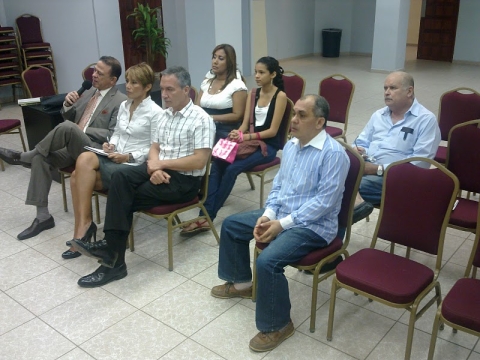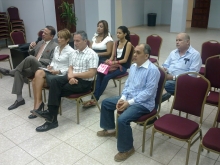

Panamanian journalists are so creative and smart using communications technologies to open discussions among colleagues about topics of national relevance. Everything without spending a single buck.
On December 11, a group of journalists used Skype and a projector in a video-conference with Luis Manuel Botello, who is senior director for special projects at the Knight International Center for Journalists, a non profit organization based in Washington, D.C. They were so interested in a discussion with Luis Manuel who have lived in the U.S. over the last few years, but is also very close and supportive to all kind of projects to improve journalism in Panama.
To include correspondents from all over the country, the organizers got a sponsorship from the Universidad Latina, whose authorities kindly allowed the use of meeting rooms and teleconference equipments installed in all campuses for the event.
The meeting was attended by members of the Forum of Journalists, the National Council for Journalism, the National College of Journalists, the Law Students Association at the Universidad Latina, ICFJ representatives, and also correspondents from David, capital of the Chiriqui province, in the Costa Rica-Panama border, and also Chitré and Veraguas, both located at the central provinces.
The discussion focused on the current challenges to press freedom in Panama. According to the participants, the challenges go from pressing phone calls from officials, libel lawsuits against journalists, espionage in the newsrooms, and even threats against reporters.
I participated with a short intervention about Mi Panama Transparente, the website to map crime and corruption with citizen information, emphasizing how important it is for today's journalists to use social media and crowdsourcing tools to produce better investigative stories. During the conference, I took photos with my cell phone and posted them immediately to Twitpic.
[video: 35984, left, medium] After the conference, I also used my cell phone to have an interview with Grisel Bethancourt, a police reporter who recently was elected as president of the National College of Journalists.
I think the enthusiasm and creativity of my Panamanian colleagues are an example to other Latin American journalists. New technologies are out there available and free for all of us. We just need to create the better way to use them. Watch the interview (in Spanish).